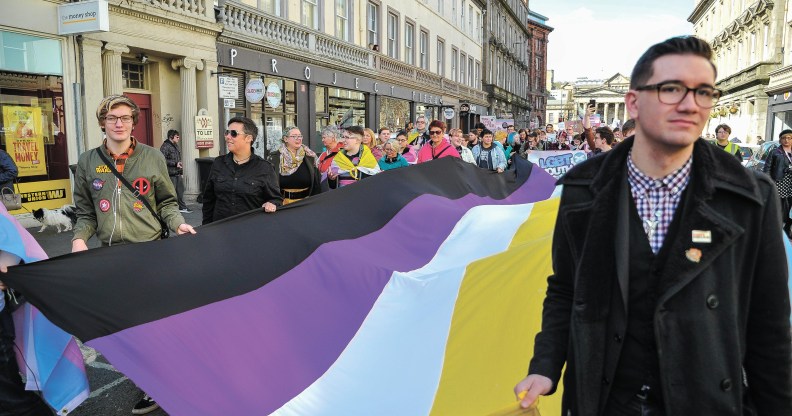Refusing to legally recognise non-binary genders is ‘undemocratic’ of Tory government, LGBT+ advocates say

People hold a non-binary flag at Pride. (Stewart Kirby/SOPA Images/LightRocket via Getty)
Deciding not to legally recognise non-binary genders in the UK is “undemocratic” of the Tories, LGBT+ advocates say.
The government has “ignored our majority call for non-binary recognition” and it is “not democratically representative of the people if you’re ignoring what the majority are asking for”, Cici Carey-Stuart, project officer at Cambridge LGBTQ+ charity Encompass Network, told Cambridgeshire Live.
Carey-Stuart added that the government also scrapped reforms to the Gender Recognition Act despite a big public consultation showing that the majority of the public back making it easier for trans people to gain legal recognition of their gender.
“It’s hard to take anything the government says seriously after this,” Carey-Stuart said.
On 21 May, the Cabinet Office confirmed that the government had “no plans” to add non-binary genders to existing gender recognition laws in the UK because the government believes it would have “complex practical consequences”.
More than 136,000 people had signed a petition asking the government to add non-binary identities to existing gender recognition laws in the UK.
The demand was for the Gender Recognition Act (GRA), which allows adult trans men and women to change their legal sex, to be amended so that non-binary people could “be legally seen as their true gender identity”.
Speaking to Cambridgeshire Live, Pip Gardner, chief executive of LGBT+ youth charity the Kite Trust, said the decision not to legally recognise non-binary genders was “disappointing”.
“The task of tackling discrimination and achieving real equity for people of all genders is complex, but it is still something our government must seek to do,” Gardner said.
“It is their responsibility to ensure that everybody’s human rights are protected by the laws of our country. A lack of legal recognition will not stop non-binary people from existing.”
In the 2018 consultation on reforming the GRA, 58 per cent of respondents thought the law should be changed to include non-binary people.
According to the government’s 2018 National LGBT Survey, just over half of trans people in the UK are non-binary.
Belgium recently committed to legally recognising non-binary people. It will be the third European country to do so, following Germany and Iceland.
Malta, most Australian territories, India, Nepal, Pakistan and Uruguay all legally recognise non-binary genders. Countries including Denmark and New Zealand, several US states and Canadian territories all offer ‘X’ gender options on legal documents for non-binary citizens.

